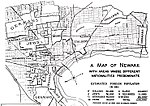Peter Francisco Park
Peter Francisco Park is a city square in Newark, New Jersey located adjacent to Newark Penn Station at the Five Corners in the city's Ironbound neighborhood. The park was established in 1966 by the Municipal Council of Newark.The park is named for Peter Francisco (July 7, 1760 – January 16, 1831), a Portuguese-born American patriot and soldier in the American Revolutionary War. It is home to several monuments, including one to the park's namesake, which was placed in 1976 during the United States Bicentennial.Its proximity to Penn Station has occasionally led to use of the park to provide assistance the homeless population in the area.The park is planned to be part of a connection between Mulberry Commons and Newark Riverfront Park.
Excerpt from the Wikipedia article Peter Francisco Park (License: CC BY-SA 3.0, Authors).Peter Francisco Park
Edison Place, Newark
Geographical coordinates (GPS) Address Nearby Places Show on map
Geographical coordinates (GPS)
| Latitude | Longitude |
|---|---|
| N 40.7330505909 ° | E -74.1642199703 ° |
Address
Edison Place 167
07102 Newark
New Jersey, United States
Open on Google Maps









